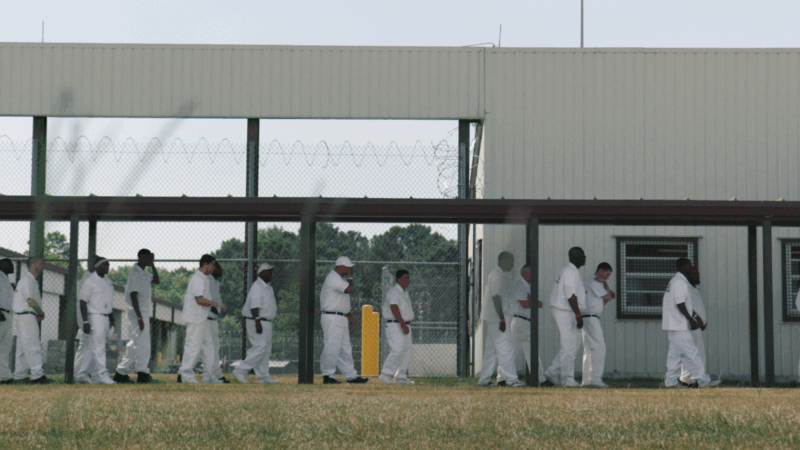‘The Alabama Solution’: a documentary with an inside look at Alabama’s prison crisis
Alabama’s prison system is one of the most violent in the country. But you don’t often hear from those inside. The Alabama Solution, a documentary about the system told from the perspective of incarcerated people, premieres on HBO Max Friday night. Directors Charlotte Kaufman and Andrew Jarecki spent six years working on the project in collaboration with Alabamian journalists. Kaufman and Jarecki sat down with WBHM’s Noelle Annonen to discuss what went into making this documentary.
This interview was edited for length and clarity.
Can you give us an overview of the film?
KAUFMAN: Our film broadly is about a system in free fall: the Alabama prison system. And specifically, it follows the stories of people both inside the prison and outside who are managing and navigating the crisis over six years. That includes a mother who’s searching for answers about the death of her son. It includes incarcerated activists who are asserting their humanity despite an extremely harmful and punitive environment. And it includes correctional officers who are also navigating a very challenging system.
Why make this documentary? What tipped you off to this Alabama problem?
JARECKI: I’ll tell you that six-and-a-half or so years ago, Charlotte and I went to Alabama. We were able to have a visit to one of the 14 men’s prisons and film a revival meeting in the prison yard. And while we were there, we discovered that there were many things going on in the prison, many things we weren’t able to see, and other areas of the prison that we were not allowed to visit. In speaking to some of the men on the yard, we realized that it was something we needed to look into much further. They asked us to try to help get their story out and it was pretty shocking to us what we were learning
Looking back on the meetings you had with incarcerated people, what are your takeaways?
KAUFMAN: We spoke to many crime victims throughout the making of this film. And something that matters to all of them is not seeing anyone else go through what either they went through or their loved one went through. And what we’re seeing in Alabama’s prisons is every day people being murdered, raped, robbed, brutalized. People are being victimized within the facilities. It just happens to not be out in the communities. It’s on the other side of a wall. We wanted to ask the question: how can we create systems that promote healing rather than harm, that can serve both crime victims and those incarcerated?
JARECKI: The feeling of having met these men, these leaders inside who have been running a non-violent protest movement for a long time, trying to defend their humanity … Those men are so capable, so thoughtful, so committed to trying to improve the lives, not just of themselves, but also of the other 20,000 people that are in the Alabama state prison system.
As directors from New York, what do you feel you lent this film about an Alabama problem?
KAUFMAN: I think perhaps the value of coming in from the outside is beginner’s mind. It’s a sort of fresh take at what’s possible and being willing to ask questions that perhaps have already been asked by brilliant minds before, but have been answered in ways that are insufficient.
JARECKI: When you have a huge crisis like the one that’s going on in Alabama and the same people are covering it and the government officials are ignoring it in many ways, you’re coming into a place where people have become inured to some of the enormous problems.
What do you hope Alabamians and people across the country take away from this documentary?
JARECKI: There are more deaths in the Alabama prison system per capita than there are in any other state that we’ve looked at. And so the question really is, are the people that are in Alabama, including the politicians, are they even familiar with their own prison system that’s occupying 25% of the state’s budget? Because there are some very well-meaning politicians who say, “Well, yeah, I visited the prison.” But our sense is that they’re getting shown a very small slice of what’s happening in the prison, that it’s very different from what the daily life is of these people who are incarcerated. And I hope that one of the things the film does is to identify how important it is for (Alabamians) to actually understand how serious these problems are. Because if they want to improve safety in the state, they’re going to have to take a very hard look at the way that they’re handling crime and the way they’re handling human beings.
KAUFMAN: One thing I also want to add is this is not just an Alabama problem. What’s happening in Alabama’s prisons is happening across the country. The only difference is we had the opportunity to see inside and we had the opportunity to meet people, both incarcerated and also staff and officers and family members who were brave enough to tell their story. So we hope that this film will not only speak to people in Alabama, but will also speak to people in our home state, New York, where we have similar brutality and similar failures. This is us trying to say, as a country, let’s look at how we’re dealing with crime. Let’s look at what it means to administer justice.
Iran’s supreme leader warns any US attack would spark ‘regional war’
Iran's supreme leader warned Sunday that any attack by the United States would spark a "regional war" in the Mideast, further escalating tensions as President Donald Trump has threatened to militarily strike the Islamic Republic.
Minnesota citizens detained by ICE are left rattled, even weeks later
The number of immigration agents in Minnesota may be reduced, but they'll leave leave behind a changed community, including many U.S. citizens questioned and detained in recent weeks.
Gaza border crossing buzzes with activity after years of near-complete closure
Reopening the border crossing is a key step as the Israel-Hamas ceasefire moves ahead.
Democrat Taylor Rehmet wins a reliably Republican Texas state Senate seat, stunning GOP
Democrat Taylor Rehmet won a special election for the Texas state Senate on Saturday, flipping a reliably Republican district that President Donald Trump won by 17 points in 2024.
Trump says feds won’t intervene during protests in Democratic-led cities unless asked to do so
President Donald Trump said Saturday that he has instructed Homeland Security Secretary Kristi Noem not to intervene in protests occurring in cities led by Democrats unless local authorities ask for federal help.
U.S. intervention in Venezuela divides Houston
In nearly two dozen interviews, Houstonians expressed everything from admiration and relief to skepticism and dread following the seizure of leader Nicolás Maduro.








